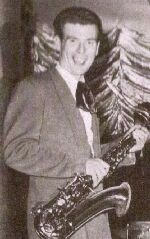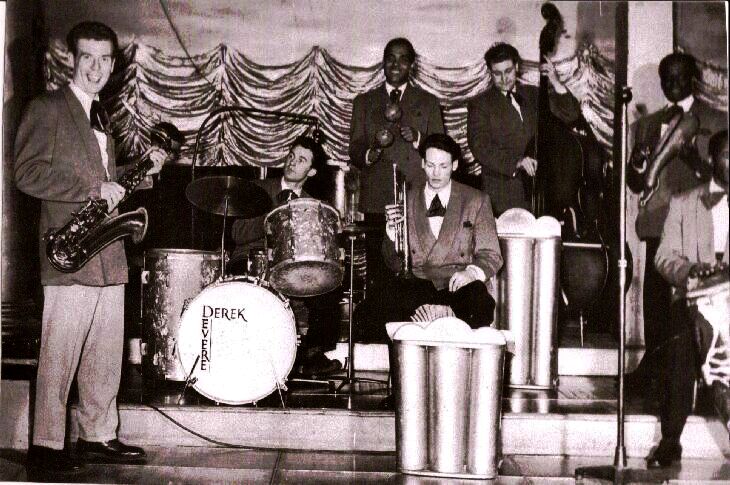










          |
| Kenny Graham - Britain's jazz original... |
 |
 Kenny Graham and the Afro-Cubists were, arguably, the one original sound to come out of British jazz in the 1950s. In fact their sound was unmatched anywhere in the jazz world of the time. After a lot of hard work and endeavour by the leader a genuine bebop front line was successfully integrated onto a latin rhythm section to produce something quite unique in jazz. The band was popular but although an artistic success was a financial disaster. It's legacy of over fifty recorded titles for Esquire remain in limbo and unavailable on CD.
Kenny Graham and the Afro-Cubists were, arguably, the one original sound to come out of British jazz in the 1950s. In fact their sound was unmatched anywhere in the jazz world of the time. After a lot of hard work and endeavour by the leader a genuine bebop front line was successfully integrated onto a latin rhythm section to produce something quite unique in jazz. The band was popular but although an artistic success was a financial disaster. It's legacy of over fifty recorded titles for Esquire remain in limbo and unavailable on CD. Graham was consistently more creative in his writing than any other British leader or musician. When his band failed he wrote for Ted Heath and Humphrey Lyttelton and produced a certain amount of film music but his absence from jazz reference works tell their own story, and it is no small criticism of the jazz world that he got so few chances in later years... Jack Cooke writing in Jazz Monthly November, 1964 said: "Kenny Graham and his Afro-Cubists, in the band's heyday constituted one of the finest most consistently inventive groups ever to appear on the British jazz scene. For the most part the band has been one of the most consistently overlooked of all British groups. When Graham first formed his band he got a fair amount of publicity and in mid-1951 he got what was then the plum job in the British jazz world when he started a long and exciting season as house band at the newly opened Studio 51 but there is little trace now that the band ever existed beyond a few out of print records. It seems to me unfair that this should be so, and in this short article I would like to go some small way toward rectifying this state of affairs by discussing the results of one of their recording sessions, to me the most successful session the band produced, and one that shows them in a reasonably accurate light as a very original group and comes somewhere near to capturing the spirit of the band". "By the time these four sides were recorded, June 4th, 1951, Graham had not only stabilised but nearly perfected his personnel". Kenny Graham's Afro-Cubists (Esquire) Jo Hunter (tp), Kenny Graham (ts), Ralph Dollimore (p), Roy Plummer (g), Cliff Ball (b), Dickie Devere (d) + maracas and conga. Chloe/Over The Rainbow/Skylon/Dome Of Discovery. "The original front line had been enriched by the addition of Roy Plummer, while the replacement of Jack Honeyborne by Ralph Dollimore had added a second writing talent to the band as well as strengthening its solo potential. The percussion department too had been organised to a high degree of efficiency ; the departure of Guy Warren had reduced the number of Afro-Cuban percussionists to two men though extra men often featured in sessions at the 51 on an irregular basis, and this relaxing of the barrage of cross rhythms, which at times threatened to engulf the entire band, allowed the splendid work of of the band's splendid orthodox drummer, Dickie Devere, to be heard to much better advantage". "The band had been in business for about nine months, if memory serves me right. At the start, inevitably, it had been a hotch-potch of too easily betrayed influences. Chief among these, of course, was that of Gillespie's big band, not in any explicit manner so much as the general atmosphere of trying to unite jazz and and Afro-Cuban rhythms on some kind of accurate and workable basis, without inhibiting either idiom; other influences, rather more directly traceable, seem to have come from Tadd Dameron's various groups, the James Moody-Chano Pozo Blue Note recording band, and Venturs's Bop for the People group. All these, however, had in this nine months been fully absorbed into the group and had been exhaustively worked through, so that what remained was a unique and readily identifiable style beholden to nobody in particular beyond Kenny Graham, a leader in far more than just the nominal sense". "Kenny Graham, I think, had immense ability in this field, an ability that has really never been explored beyond this venture with the Afro-Cubists. As a tenor player he was efficient rather than inspired, working in a Lester Young-Wardell Gray groove that ran somewhat against the prevailing Getz fashion of the period, but as a leader and organiser of a group identity he had, and has continued to have, few equals in this country. Had he been able to continue as an active bandleader I think he would have an immensely beneficial effect on this country's jazz, but all such speculation is now unfortunately quite academic; it is unlikely that he will ever again forsake his work as an arranger to lead his own group". continued top of right hand column...  Kenny Graham biography and discography... the early classic records... The Afro-Cubists... The Afro-Cubists and the Melody Maker... Kenny Graham the composer... |
"At the session under discussion, supervised by Carlo Krahmer for his Esquire label, the band produced four sides, two original compositions, one each by Graham and Dollimore, and two performances of standard material... Over the Rainbow, taken at a slow medium pace and with a re-organised, rather boppish melody line, more involved with percussive phrases than the original, is the kind of standard one would expect from this period, a show tune with considerable harmonic interest for the musicians... there are sixteen bars of solo space each... and of these Graham's own is the most spectacular here; it is well organised and and imaginative, and in many ways his best solo of the session. Chloe.... is a fast, flashing performance. The sequence follows much the same pattern as Rainbow with 16 bars each in the same sequence following the melody chorus but there is a further 32 bars added shared out in fours between Graham, Hunter, and the fierceand violently inventive drumming of Dickie Devere. Chloe is the wildest performance of the four produced at the session, and from it one can get some idea of the fire and brilliance that the band could produce on such numbers, much curtailed though this particular performance is by the enforced three minutes of the 78 record. Graham's band, I recall, was extremely happy on extended performances, and maybe this factor contributed to the lack of really good records this group produced in it's lifetime. Skylon is Kenny Graham's piece; it has a short theme, only four bars, under which the rhythm triples to 12/8 , and then 16 bars of solo in the order tenor, guitar, trumpet and piano, with a further statement of theme before each solo starts. All the solos are good here but beyond doubt the highspot is Joe Hunter's trumpet work. Hunter had a bright, clear tone and an obvious admiration for Gillespie's work, but although Gillespie's playing formed the basis of his style Hunter had plenty of imagination on his own account and his work was never just a slavish imitayion of his master. Here and there in his work, and particularly on Skylon, can also be found echoes of that other neglected trumpeter sonny Berman. The last I heard of Hunter, and this was a couple of years ago now, he was working in the obscurity of one of London's few remaining palais bands. The last number of the session, Ralph Dollimore's Dome of Discovery, balances the slowish tempo of Skylon with another bright, up-tempo performance, with a sixteen bar, non-repeating, roller-coaster of a theme that slips from 4/4 to 3/4 in the final stage. The solo sequence is is 32 bars each from guitar, tenor, trumpet and piano, all taken at 4/4 but introduced by four bars in 3/4 taken from the end of the theme. Graham's solo here falters a little in the last half after a very good start, but the rest of the soloists play well up to standard, with dollimore producing his best solo of the session and getting his stylistic blend of Powell and Tristano really under control. The Afro-Cubists did several sessions for Esquire after this one, with differing personnels and equally differing results, but this particular session stands for me, as the pinnacle of Graham's achievements with this group. It is not such an ambitious session as some of the later ones, particularly those using five saxophones, but ambition and achievement do not always go hand in hand and here, in these records from the 4th of June, 1951, is what I feel to be Kenny Graham's music at its best". From The Essential Jazz Records (by Harrison, Thacker and Nicholson): "The Afro-cubists recorded Ventura's 1948 Pina colada... but Graham, even on his first session, turned it into something considerably more interesting than the composers version. In fact... so Graham's music was the result of personal insights. He founded what almost certainly was the first regular working British jazz group, apart from the Johnny Dankworth Seven, with a real claim to originality in the modern idiom. It lasted for slightly less than two years 1951-2, later reforming for Esquire recording sessions, a few club dates, an occasional broadcast. Graham's contacts in London's West Indian community led him to several outstanding rhythm players, some of whom were in fact Africans who had come to Britain with various dancing troupes. The contribution of such musicians combined with first Devere's and then Seamen's bop drumming - then exceptional by European standards - not only provided Graham with a rhythm section livelier than any other on the UK scene of that time but also with rhythmic counterpoint as meaningfully complex as almost anything heard on recordings by the American boppers. The personnel details suggested the band would be rhythm-heavy... it rarely was... a tribute not only to the players but also to Graham's skill in composing, arranging, and in the less easily defined craft of bandleading". "All the writng was of course by him, and along with his own original pieces he adopted some excellent jazz themes by others... unavoidably there was a scattering of Tin Pan Alley products... even here, though, there was no feeling of Latin American percussion being merely grafted on to a jazz front line, or vice versa... Graham had a desire to unify each performance and to mitigate the unthinking theme-solos-theme routine of so much jazz". By the 1953 recording dates the Afro-Cubists had been forced to disband, yet this meant that Graham had more time to devote to his composing. As much was symbolized by the expansion of the front line to six instruments, although this added no fresh individual voices and the solos still came from Hunter, Dollimore and the leader. Graham then recorded his longest composition so far the Caribbean Suite that came in eight movements and lasted for 23 minutes. A real sense of occasion is evident and both Graham and Hunter are at their absolute best in what are perhaps the most inspired improvisations they ever recorded. In composing this work Graham faced a considerable test and one that he passed with much credit. Each movement has it's own character yet all eight are clearly related. |